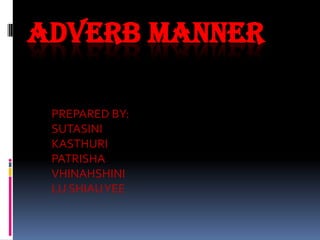
Adverb manner slide
- 1. ADVERB MANNER PREPARED BY: SUTASINI KASTHURI PATRISHA VHINAHSHINI LU SHIAU YEE
- 2. ADVERB Adverbs are used to modify a verb, an adjective, or another adverb: [1] Mary sings beautifully [2] David is extremely clever [3] This car goes incredibly fast
- 3. Formal Characteristics of Adverbs Most adverbs of manner are formed by adding ‘-ly’ to an adjective, but sometimes other spelling changes are needed. We cannot form adverbs from adjectives that end in ‘-ly’. Some adverbs have the same form as adjectives. We do not use adverbs after link verbs, you use adjectives. Adverbs of manner are sometimes prepositional phrases or noun groups.
- 4. Spelling rules for adding - ly In most cases, ly is simply added to the positive form of the adjective. For example: Adjective sad beautiful quick soft Adverb sadly beautifully quickly softly
- 5. Adjectives ending in -ic However, when the adjective ends in ic, the syllable al is usually added before the ly ending. For example: Adjective Dramatic Specific Scientific Adverb Dramatically Specifically Scientifically
- 6. . Adjectives ending in le When the adjective ends in le preceded by a consonant, the final e is usually changed to y, to form the ly ending. For example: Adjective favourable humble simple Adverb favourably humbly simply
- 7. When the adjective ends in le preceded by a vowel, in most cases, ly is simply added to the positive form of the adjective. For example: Adjective Agile Sole Adverb Agilely Solely However, in the case of the adjective whole, the final e is removed before the ending ly is added: Adjective Whole Adeverb wholly
- 8. Adjectives ending in ll When the adjective ends in ll, only y is added. For example: Adjective Dull Full Shrill Adverb Dully Fully Shrilly Adjectives ending in ue When the adjective ends in ue, the final e is usually omitted before the ending ly is added. For example: Adjective Due True Adverb Duly Truly
- 9. Adjectives ending in y When the adjective ends in y preceded by a consonant, the y is usually changed to i before the ending ly is added. For example: Adjective Busy Easy Happy Adverb busily Easily Happily However, in the case of the adjectives shy and sly, ly is simply added to the positive form of the adjective: Adjective Shy Sly Adverb Shyly Slyly
- 10. When the adjective ends in y preceded by a vowel, in most cases, ly is simply added to the positive form of the adjective. For example: Adjective Coy Grey Adverb Coyly Greyly However, in the case of the adjective gay, y is changed to i before the ending ly is added: Adjective Gay Adverb Gaily
- 11. Adverbs which do not use the The adverb of manner well appears unrelated to ending ly the corresponding adjective, good. Good and well both have the comparative form better and the superlative form best. Adjective Good Adverb Well
- 12. It should be noted that in addition to being used as an adverb, the word well can also be used as an adjective with the meaning healthy. The adjective well is most often used as a predicate adjective. e.g. Well used as an Adjective: I hope you are well. Well used as an Adverb: He did well on the examination. In the first example, well is a predicate adjective, modifying the pronoun you. In the second example, well is an adverb of manner, modifying the verb did.
- 13. The following table gives examples of adverbs of manner, location, time and frequency which have the same forms as the corresponding adjectives. Adjective Fast Hard Little Loud Much Straigh t Adverb Fast Hard Little Loud Much Straight
